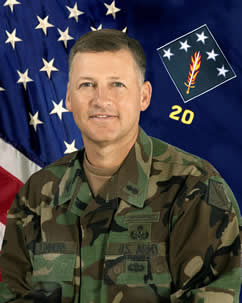Colonel
Paul R. Plemmons
 Colonel Paul R. Plemmons was born on August 4, 1953, in Gainesville, Florida. He attended Ordnance Officer Basic Course at Aberdeen Proving Ground, Maryland in August 1978. Upon completion, he attended Airborne School before reporting to his first duty assignment as the Maintenance Platoon Leader for Charlie Company of the 709th Corps Support Battalion (Forward) at Fort Lewis, WA.
Colonel Paul R. Plemmons was born on August 4, 1953, in Gainesville, Florida. He attended Ordnance Officer Basic Course at Aberdeen Proving Ground, Maryland in August 1978. Upon completion, he attended Airborne School before reporting to his first duty assignment as the Maintenance Platoon Leader for Charlie Company of the 709th Corps Support Battalion (Forward) at Fort Lewis, WA.
Plemmons next completed the Ammunition Officer Basic Course and the Explosive Ordnance Disposal Course before being assigned as the commander of the 146th Explosive Ordnance Disposal Detachment at the US Military Academy at West Point, NY. Following that assignment, Plemmons served as an Army Reserve Officer Training Corps (ROTC) instructor at the University of Minnesota.
After a two year assignment as the Maintenance Officer for the Foreign Military Sales in the Military Assistance Program in Amman, Jordan, he returned to the US to join the 7th Infantry Division (Light) at Fort Ord, California as the Division Ammunition Officer in 1990, where he was deeply involved in reestablishing the rapid deployment ammunition inventories and implementing the lessons learned during 7th Infantry Division’s deployment to Panama for Operation Just Cause. One year later, Plemmons was selected as the Executive Officer for the 707th Main Support Battalion, where he would again be involved with the full scope of the logistics support to a Light Division as well as the stand-down of the division.
Following his assignment at the Command and General Staff College, Fort Leavenworth, KS as a student for a year and an instructor for two years, he was selected to be a Professor of Military Science at Duke University in Durham, NC. In 1998, Plemmons was selected to command the 191st Ordnance Battalion (Ammunition) in Miesau, Germany. His battalion was responsible for the ammunition support of European based forces deploying in support of Kosovo operations. As well, he formed a joint Explosive Ordnance Disposal (EOD) task force to deal with the anticipated unexploded ordnance problem.
After an assignment at the US Army War College, Plemmons commanded the Sierra Army Depot at Herlong, CA, from 2002 to 2005. Plemmons was instrumental in leading the Sierra Army Depot’s mission reorientation from ammunition demilitarization to that of joint logistics center. The depot became the clearing house for Operation Iraqi Freedom retrograde supplies and the storage site for excess vehicles.
Concurrently with command of Sierra Army Depot, Plemmons conducted multiple deployments in support of Operation Iraqi Freedom. Twice, he was put in charge of the Forward Repair Activity, Logistics Support Element Southwest Asia at Camp Arifjan, Kuwait. In addition, he was sent forward to Baghdad to become the Chief of the Captured Enemy Ammunition operations (nicknamed Task Force Bullet) from June 2003 to February 2004. In those eight months, his organization planned and executed a survey of all major ammunitions sites, surveyed over 600,000 tons of capture enemy ammunition and secured and / or destroyed over 200,000 tons of captured enemy ammunitions.
Plemmons’ final assignment was as Deputy Commander of the 20th Support Command (Chemical, Biological, Radiological, Nuclear and High Yield Explosives - CBRNE) at Aberdeen Proving Ground, MD from 2005 to 2007.
During this time, Plemmons became the moving force behind the establishment of Combined Joint Task Force - Troy (CJTF-Troy) in Baghdad, Iraq. The mission of CJTF-Troy was to exercise command and control of specialized counter-IED forces and coordinate and synchronized efforts focused on IED intelligence collection and development, materiel solutions to address the threats, and training throughout the region in order to defeat the IED threat. The Task Force would include the specialized units for Explosive Ordnance Disposal, Weapons Intelligence, Explosives Exploitation and Technical Escort. He deployed in April 2006 with the mission of establishing CJTF-Troy and achieving Full Operational Capability by 2007, accomplished by October of 2006.
The Task Force built 121 target packages, which allowed the capture of many High Value Targets and the seizure of at least one Explosively Formed Penetrator cell and one cell-phone bomb cell. The EOD render safe and forensics capabilities lead to hundreds of arrests and convictions of bomb marker, financiers and emplacers. The Task Force also developed and insured the widest dissemination of Counter-IED tactics, techniques and procedures to U.S. and Coalition forces in the Iraq theater area.
Colonel Paul R. Plemmons retired on October 1, 2007.